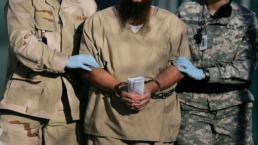Why we must never forget the human rights travesty of America’s gulag.
By Lisa Mullenneaux, The Progressive
Clive Stafford Smith, the distinguished human rights attorney who co-founded the anti-death penalty nonprofit Reprieve and whose work earned him the Gandhi International Peace Award in 2005, maintains a frenetic travel schedule as part of his global fight against injustice. Between flights, Stafford Smith took the time to speak to The Progressive about the latest prisoner from the Guantánamo Bay Detention Camp that he has agreed to represent—the eighty-eighth since 2002.

“Eighty-five are home, and another two will be soon, hopefully,” Stafford Smith says, emphasizing that being cleared for release doesn’t mean one gets to leave. Regarding his twenty years spent visiting America’s gulag, Stafford Smith vows, “I was here when it started, and I plan to be here when it ends.”
When he volunteered his services in 2002 to detainees held as “enemy combatants” at Guantánamo Bay in Cuba, Stafford Smith had established a reputation as a death penalty lawyer who represented 300 prisoners in the southern United States, preventing execution in all but six cases. He joined attorneys like the late Michael Ratner, as well as Joe Margulies and Tom Wilner, all of whom believed that then President George W. Bush’s Executive Order establishing military tribunals to combat “international terrorism” was unconstitutional. When asked why he volunteered—a choice that still consumes him—he answered that “liberty is eroded at the margins.”
In other words, what we don’t see can hurt us, and in 2002—in the wake of the 9/11 attacks—the Bush Administration was determined to ignore the rule of law. In her 2008 book, The Dark Side, The New Yorker staff writer Jane Mayer details the extraordinary lengths Stafford Smith went to in order to discover the names of missing people who might be inside Guantánamo.
Recent Posts
‘Unconstitutional. Unethical. Authoritarian.’ ICE Bars Millions Of Immigrants From Bond Hearings
July 18, 2025
Take Action Now One watchdog said the new policy “seems like a blatant attempt to stop them from exercising their right to due process.”……
Americans Are Not Nearly Alarmed Enough About Climate Change
July 18, 2025
Take Action Now Americans still don’t comprehend how imminent, dangerous, and far-reaching the threat is—and journalists are partly to blame.By…
The IRS Is Building A Vast System To Share Millions Of Taxpayers’ Data With ICE
July 17, 2025
Take Action Now ProPublica has obtained the blueprint for the Trump administration’s unprecedented plan to turn over IRS records to Homeland Security…
Israel’s Sudden Assault On Syria Is Unchecked Aggression
July 17, 2025
Take Action Now Jerusalem is bombing Damascus and threatening al-Sharaa’s rule, while Washington was hoping to help the nascent government on…




